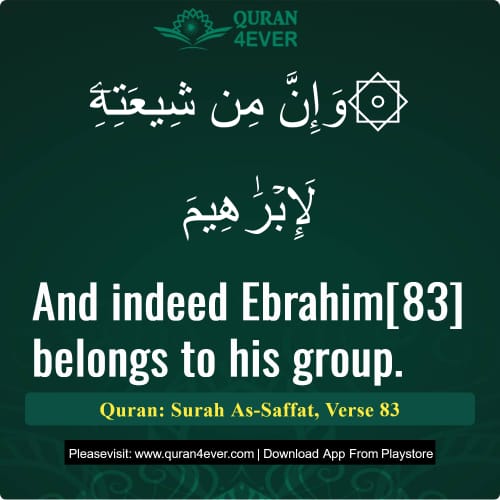
Transliteration:( Wa inna min shee'atihee la Ibraaheem )
"And indeed Ebrahim [83] belongs to his group."
This verse links Prophet Ibrahim (عليه السلام) to the same spiritual lineage and mission as Prophet Nuh (عليه السلام). By saying “belongs to his group”, Allah is affirming that Ibrahim followed the same path of pure monotheism, truth, and resistance against falsehood that characterized Nuh’s message.
Though the word "group" (Shi‘ah) is usually used in the Qur’an to refer to infidel communities (and it appears in that sense in several verses), here it has a positive connotation, meaning a group of like-minded believers.
Some scholars note this usage to emphasize that Ibrahim arose among idolaters, just as Nuh did, and yet he firmly rejected the religion of his people. His own statement supports this:
“I find you and your people in manifest error” (Surah Al-An’am 6:74)
This verse introduces the next narrative in the Surah—the struggles and faith of Prophet Ibrahim, as part of the continuity of divine guidance through the ages.
83. And verily, among those who followed his way was Ibrahim. 84. When he came to his Lord with a Salim heart. 85. When he said to his father and to his people: “What is it that which you worship” 86. “Is it a falsehood — gods other than Allah — that you desire” 87. “Then what think you about the Lord of the all that exists”
`Ali bin Abi Talhah reported that Ibn `Abbas, may Allah be pleased with him:
(And verily, among those who followed his ways was Ibrahim.) means, he was one of the followers of his religion. Mujahid said, “He was following his path and his way.”
(When he came to his Lord with a Salim heart.) Ibn `Abbas, may Allah be pleased with him, said, “This means that he bore witness that none has the right to be worshipped except Allah.” rIbn Abi Hatim recorded that `Awf said, “I said to Muhammad bin Sirin, `What is the Salim heart’ He said, `One which knows that Allah is true and that the Hour will undoubtedly come to pass, and that Allah will resurrect those who are in the graves.”’ Al-Hasan said, “One that is free from Shirk.” `Urwah said, “One that is not cursed.”
(When he said to his father and to his people: “What is it that which you worship”) He denounced his people for their worship of idols and false gods, Allah said:
(Is it a falsehood — gods other than Allah — that you desire Then what think you about the Lord of the all that exists) Qatadah said, “This means, `what do you think He will do with you when you meet Him, given that you worshipped others alongside Him”
(37:83) Abraham was on the self-same way (as Noah).
There is no commentary by Abul Maududi available for this verse.

For a faster and smoother experience,
install our mobile app now.
Related Ayat(Verses)/Topics